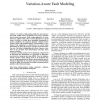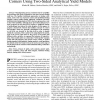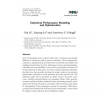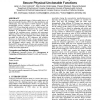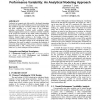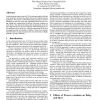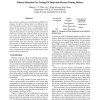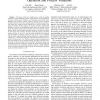144
click to vote
ATS
2010
IEEE
15 years 3 days ago
2010
IEEE
Abstract--To achieve a high product quality for nano-scale systems both realistic defect mechanisms and process variations must be taken into account. While existing approaches for...
150
click to vote
TCAD
2008
15 years 2 months ago
2008
Manufacturing process variations lead to variability in circuit delay and, if not accounted for, can cause excessive timing yield loss. The familiar traditional approaches to timin...
135
click to vote
TCAD
2008
15 years 2 months ago
2008
We present an efficient optimization scheme for gate sizing in the presence of process variations. Our method is a worst-case design scheme, but it reduces the pessimism involved i...
113
click to vote
CORR
2007
Springer
15 years 2 months ago
2007
Springer
This paper considers a developing theory on the effects of inevitable process variations during the fabrication of MEMS and other microsystems. The effects on the performance and ...
119
click to vote
FTEDA
2006
15 years 2 months ago
2006
As IC technologies scale to finer feature sizes, it becomes increasingly difficult to control the relative process variations. The increasing fluctuations in manufacturing process...
169
click to vote
ISLPED
2010
ACM
15 years 2 months ago
2010
ACM
The unique and unpredictable nature of silicon enables the use of physical unclonable functions (PUFs) for chip identification and authentication. Since the function of PUFs depen...
125
click to vote
DAC
2005
ACM
15 years 4 months ago
2005
ACM
A physical yet compact gate delay model is developed integrating short-channel effects and the Alpha-power law based timing model. This analytical approach accurately predicts bot...
117
click to vote
ASPDAC
2005
ACM
15 years 4 months ago
2005
ACM
As the minimum feature sizes of VLSI circuits get smaller while the clock frequency increases, the effects of process variations become significant. We propose a UST/DME based ap...
116
click to vote
DATE
2004
IEEE
15 years 5 months ago
2004
IEEE
Due to process variations in deep sub-micron (DSM) technologies, the effects of timing defects are difficult to capture. This paper presents a novel coverage metric for estimating...
122
click to vote
ICCAD
2007
IEEE
15 years 6 months ago
2007
IEEE
This paper solves the variation-aware on-chip decoupling capacitance (decap) budgeting problem. Unlike previous work assuming the worst-case current load, we develop a novel stocha...
